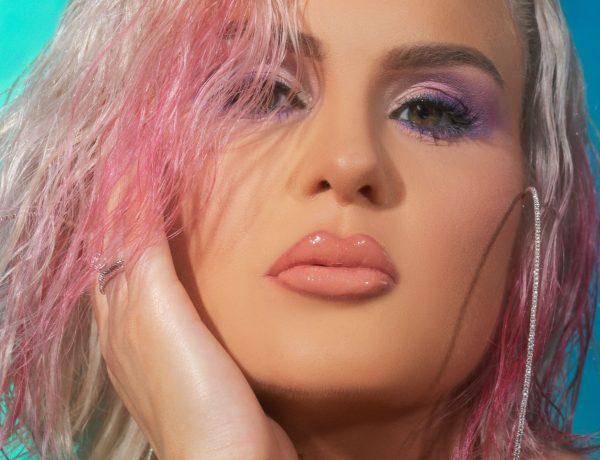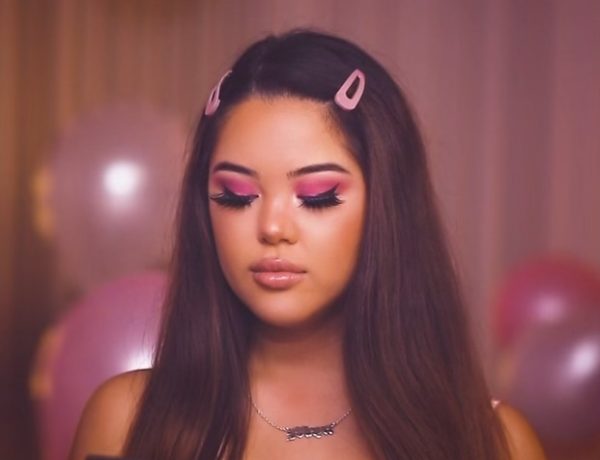Shanee Pink never stayed too long in one place. She grew up in Tel Aviv, Israel, went to school in New York, and now spends most of her time in California. Even now, she never really stops traveling while looking for a new project. Her Instagram is a capsule of those travels from sprawling urban settings playing guitar in the middle of the street or in a subway to yoga on the beach, naked mornings in Laurel Canyon California, and camping in the desert.
Yet, “hippie” and “hipster” are labels she rejects, or at least feels uncomfortable with. That’s in part because, as a musician, there’s a certain connotation of hippie music associated with The Grateful Dead, Joni Mitchell, and the whole flower generation. Shanee Pink’s music certainly wouldn’t fit that description.
Her latest EP, Twin Flame, dropped August 28, and it’s a shift back to some of the electronic sounds she was playing with on her 2012 release of Our United Hearts. However, fans of her 2014 effort Spreading in the Light will notice a fairly stark difference, both in the kind of music as well as the tone.
That emotional shift in her music comes from the same source as most great music—a broken relationship.
“I was writing this music and it had to do with the relationship I was in. It was a peculiar relationship that was pushing on all of my buttons,” Pink said.
The title of Twin Flame sets the stage for the album’s theme.
“A twin flame is when somebody comes into your life and ignites a certain fire in you or pushes your buttons in certain ways,” she said. “It may not always be pleasant, but it makes you grow as a human being and you learn a lot about yourself.”
Yet, “hippie” and “hipster” are labels she rejects, or at least feels uncomfortable with. That’s in part because, as a musician, there’s a certain connotation of hippie music associated with The Grateful Dead, Joni Mitchell, and the whole flower generation. Shanee Pink’s music certainly wouldn’t fit that description.
Her latest EP, Twin Flame, dropped August 28, and it’s a shift back to some of the electronic sounds she was playing with on her 2012 release of Our United Hearts. However, fans of her 2014 effort Spreading in the Light will notice a fairly stark difference, both in the kind of music as well as the tone.
That emotional shift in her music comes from the same source as most great music—a broken relationship.
“I was writing this music and it had to do with the relationship I was in. It was a peculiar relationship that was pushing on all of my buttons,” Pink said.
The title of Twin Flame sets the stage for the album’s theme.
“A twin flame is when somebody comes into your life and ignites a certain fire in you or pushes your buttons in certain ways,” she said. “It may not always be pleasant, but it makes you grow as a human being and you learn a lot about yourself.”
One of those relationships was a very public one with Nev Schulman, host of the popular MTV show Catfish. For those living under a rock, on Catfish, Schulman helps people in online relationships find out if they are being duped by someone pretending to be someone they are not—also known as catfishing. Schulman himself was catfished and filmed it all in a movie (“documentary” might be too generous a title) that launched his career. Therefore, to this day his relationships tend to be a rather public event.
Although the couple were able to keep the majority of their relationship out of the public eye, it still left a mark on Pink.
“He was a big part of my life in the last two years; not to say this album is about him, but it’s about a lot of lessons I learned (in that time),” she said.
Talking on relationships more generally, Pink said she’s learned a lot from her past romantic entanglements and it comes out on this album.
“In every relationship you meet a person and they are kind of embarrassed of you, or you see your insecurities come up in your interaction with them. Or you kind of compare each other or learn something from the way they conduct themselves and learn that you’re not conducting yourself in a certain way,” Pink said. “In that way, I felt like it made me grow. I felt like I wasn’t owning my own artistry and I wasn’t working hard enough on my own career.”
Part of working more on her career meant discovering what her sound is as a musician. She enlisted some new help on Twin Flame to make it more poppy and electronic.
“I think, before, I was writing everything on my own and half producing it on my own, so I was more a little more limited with the tools I had to express myself,” Pink said. “This time, I was working with people who really helped me take what I was doing to the next level. They gave me more tools to express myself. I think that’s why this album is a little more produced and a little more vibrant.”
The switch to a more electronic sound, she said, was a conscious decision on her part.
“I really loved LCD Soundsystem because they weren’t just electronic dance music; they were great songs that were written to an electronic scale… I wanted to be part of the party.”
Electronic pop music isn’t exactly what we think of when describing hippies, and yet Pink is a leader in one such movement in the Laurel Canyon. She books artists for the Laurel Canyon Music Revival, a monthly gathering of artists that started in her home but has since moved to The Kibitz Room in West Hollywood.
Although the couple were able to keep the majority of their relationship out of the public eye, it still left a mark on Pink.
“He was a big part of my life in the last two years; not to say this album is about him, but it’s about a lot of lessons I learned (in that time),” she said.
Talking on relationships more generally, Pink said she’s learned a lot from her past romantic entanglements and it comes out on this album.
“In every relationship you meet a person and they are kind of embarrassed of you, or you see your insecurities come up in your interaction with them. Or you kind of compare each other or learn something from the way they conduct themselves and learn that you’re not conducting yourself in a certain way,” Pink said. “In that way, I felt like it made me grow. I felt like I wasn’t owning my own artistry and I wasn’t working hard enough on my own career.”
Part of working more on her career meant discovering what her sound is as a musician. She enlisted some new help on Twin Flame to make it more poppy and electronic.
“I think, before, I was writing everything on my own and half producing it on my own, so I was more a little more limited with the tools I had to express myself,” Pink said. “This time, I was working with people who really helped me take what I was doing to the next level. They gave me more tools to express myself. I think that’s why this album is a little more produced and a little more vibrant.”
The switch to a more electronic sound, she said, was a conscious decision on her part.
“I really loved LCD Soundsystem because they weren’t just electronic dance music; they were great songs that were written to an electronic scale… I wanted to be part of the party.”
Electronic pop music isn’t exactly what we think of when describing hippies, and yet Pink is a leader in one such movement in the Laurel Canyon. She books artists for the Laurel Canyon Music Revival, a monthly gathering of artists that started in her home but has since moved to The Kibitz Room in West Hollywood.
“I think I started it because I feel like people don’t hang out with each other in a casual manner and meet people in real life,” Pink said. “I really wanted to encourage other people to do that too, to host a place where people can meet each other, but also just to have a place where live music can happen.”
Read more Music Interviews on ClicheMag.com
Read more Music Interviews on ClicheMag.com
Shanee Pink Interview: Photos by Thom Shelton




